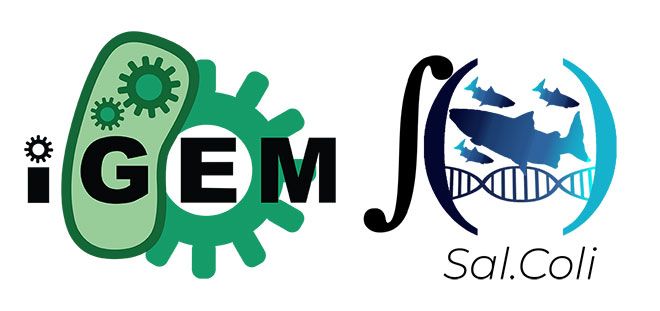The International Genetically Engineered Machine (iGEM) Foundation is a non-profit organization dedicated to the advancement of synthetic biology. This year's competition opens to include modeling in the project. Due to the corona virus pandemic, the iGEM Giant Jamboree goes virtual and everyone is welcome to join (see below).
A detection system and approach for treating amoebic gill disease
Aquaculture is subject to 15-20% loss in terms of number of fish per year. Most of this loss is death, among the causes are parasitic diseases and their treatment, including Amoebic gill disease. AGD is caused by Paramoeba perurans (P. perurans) affecting Atlantic salmon, the most important fish species in Norwegian Aquaculture.
Our project aims to create an automatic detection system. To create this system we are investigating collective behaviors and how one can use them to diagnose diseases. We also aim to use genetically modified Escherichia coli to produce salinomycin, an antiparasitic compound.
The team has:
- By modelling created an automatic system to detect amoebic gill disease in Salmon. To create this system they are investigating aberrant or deviation of collective/normal behavior in fish schools and how one can use them to diagnose diseases.
- Described a wetlab model where they use genetically modified Escherichia coli to produce salinomycin, an antiparasitic compound.
This is an example of how Synthetic biology and modeling will be able to complement current diagnostic tools and treatments used in aquaculture today.
By the end of the project we had a great pipeline for generating schooling data, importing that data and creating animations where sick and healthy behavior was visible. This is something I am quite proud of, says Martin Eide Lien.
The UiO iGEM team
The cross-disciplinary student team representing the University of Oslo at the iGEM annual synthetic biology competition, is ready to present their project “Sal. coli”. It is the only team from Norway this year, and might be the smallest ever participating.
Being a small team was challenging, especially during COVID times as recruiting new members quickly became difficult. This meant we had to take more responsibility individually, while a higher work load, it probably lead to a greater learning outcome, says Jonas Aouay Grønbakken.

UiO has participated in the iGEM competition every year since 2014. Our 2020 team consists of:
- Alexander Refsnes-Petkovic. Alexander did his bachelor thesis in aquaculture management. He has started his master studies at the Department of Biosciences, UiO.
- Jonas Aouay Grønbakken. Jonas is doing his master in cybernetics and autonomous systems at the Department of Informatics at UiO.
- Martin Eide Lien. Martin is doing his master's thesis in biotechnology with a focus on computational and systems biology at the Norwegian University of Science and Technology (NTNU). Marin participates on a free basis on the Oslo team, since NTNU does not compete in this year's competition.
- More about the persons in the iGEM team (igem.org)
- The supervisors: Athanasios Saragliadis, Kirsten Borse Haraldsen and Dirk Linke.
This year have been an amazing journey and we are grateful for the input from all team members as well the great support received from our supervisor's, with a special thanks to the head Pi Dirk Linke for leading us across the finish line and the expert support from integrated human practice that contributed to our project. And a big thanks to the Department of Biosciences and the University of Oslo for being our team's sponsor in this year, says Alexander Refsnes-Petkovic.
Presenting their contribution
The team has made available their interactive poster (igem.org) (click on the elements: the title, squares etc.), as well as a video (igem.org) explaining their project.
Judging during iGEM focuses on evaluating team projects and presentations while providing constructive and positive feedback to the teams. Teams are only competing with themselves to achieve the medal criteria.
The International Genetically Engineered Machine Foundation
iGEM biggest program is their annual friendly competition, that gives students the opportunity to push the boundaries of synthetic biology by tackling everyday issues facing the world:
Made up of primarily university students, multidisciplinary teams work together to design, build, test, and measure a system of their own design using interchangeable biological parts and standard molecular biology techniques. Every year nearly 6,000 people dedicate their summer to iGEM and then come together in the fall to present their work and compete at the annual Jamboree.
Judging during iGEM focuses on evaluating team projects and presentations, while providing constructive and positive feedback to the teams. Teams are only competing with themselves to achieve the medal criteria.
We encourage any student to participate in iGEM in the future years to come, due to it’s a good place to start learning synthetic biology, says the UiO iGEM-team.
Presentation for the judges
On Sunday, November 15th, the UiO team will present their project at 14:00 (Norwegian time) and have a poster session at 17:30-18:00 (Norwegian time).
This year, due to the corona virus pandemic, iGEM had to move to an all digital Jamboree. Guests can join online at the iGEM 2020 Virtual Giant Jamboree November 13-22, 2020 by registering (igem.org).
